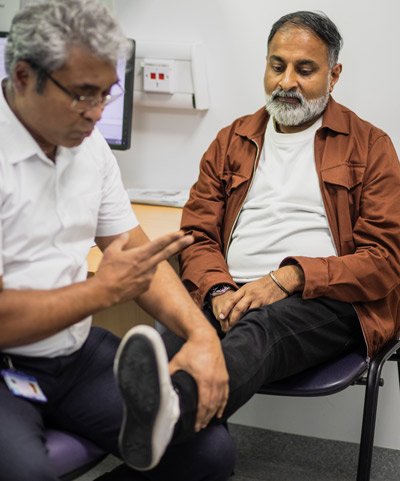There is no single test to work out if you have MND. Getting MND diagnosed involves assessment by a neurologist and tests to rule out other causes.
Select from the following options or search for content by need with our:
Care information finder
It took several tests and visits to different places before MND was diagnosed.
Which professionals should I see?
Arrange an appointment with your GP if you think you might have MND. If your GP thinks you have a condition affecting the nerves or brain, this could be a neurological problem and you will be referred to a neurologist.
For more details about these and other professionals involved in MND care, see our page about Types of care and who provides them.
What tests are used to help diagnose MND?
If your neurologist thinks a neurological problem is causing your symptoms, they may do tests. There is no single test to get MND diagnosed, but a range of tests can help rule out other causes. You usually attend these appointments as an outpatient but in some cases you may need a short stay in hospital.
Depending on your symptoms, your neurologist may advise the following tests:
Clinical examination:
This assessment helps the neurologist work out which tests are appropriate, depending on your symptoms.
Blood test:
This looks for a rise in a substance called creatine kinase. This is produced when muscle breaks down and is sometimes found in the blood of people with MND. However, it may indicate other conditions.
Electromyography (EMG):
Sometimes called the needle test, an EMG uses fine needles to record natural nerve impulses within certain muscles. When muscles start to lose their nerve supply, this can be detected, even if the muscle activity still seems normal.
Nerve conduction test:
This applies an electrical impulse through a small pad on the skin to measure the speed at which nerves carry electrical signals.
Transcranial Magnetic Stimulation (TMS):
TMS measures the activity of the upper motor neurones to help diagnosis.
Magnetic Resonance Imaging (MRI):
An MRI scan involves being placed in a cylinder-like machine. The machine takes internal images of the body and your neurologist uses these to help rule out conditions such as stroke, Alzheimer’s disease, Parkinson’s disease, multiple sclerosis, tumours and trapped nerves. These scans can also detect injury to the spine and brain.
If testing does lead to a diagnosis of MND, see Newly diagnosed?
Tell us your thoughts on this webpage
Page last updated: 13 February 2025
Next full review: February 2027
